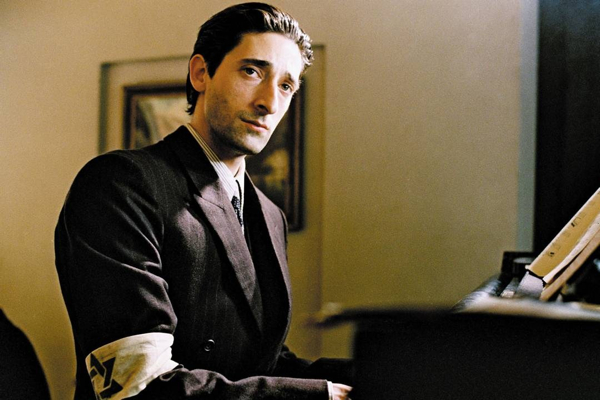Movie review by Greg Carlson
With “The Pianist,” master filmmaker Roman Polanski delivers one of his most engaging and fully realized movies in ages. An uncompromising, unsentimental adaptation of concert pianist Wladyslaw Szpilman’s memoir of surviving the Holocaust, “The Pianist” affords Polanski an opportunity to explore some of what one imagines are the most painful memories of his own childhood (the director’s mother died in the gas chambers while the young Polanski lived by his wits on the streets of Krakow). In fact, Polanski has not worked in Poland since the time of his debut feature, “Knife in the Water,” which he made in 1962.
One need only examine the film’s opening scene to appreciate the uniquely skewed worldview of Polanski, who depicts Szpilman (an excellent Adrien Brody, arguably turning in his best performance to date) at work in a Warsaw radio station, elegantly and serenely engrossed in Chopin as the windows are rattled by the explosions of German shells. Szpilman refuses to cease playing, even as the technicians in the sound booth pack up and head for cover. Not until a percussive blast literally knocks him from his bench does the pianist decide he should leave. Szpilman’s defiance – marked by a standoffish distance he maintains with others – will ultimately aid and hinder him in equal measure.
Like other wealthy families, the Szpilmans are totally convinced that the Nazis will be stopped by the Allies before things become unbearable. Together, they make the tragic, catastrophic decision to remain in their home, even as the Germans establish control of the city. Swiftly, absurdly, they are forced – along with nearly 500,000 other Jews – into the tiny Warsaw ghetto. Polanski details the progression of events with a chilling economy: privately, the Szpilman family angrily resists the Nazi edicts printed in the local paper. On the streets, however, they wear Star of David armbands and step over corpses as they try to carry on in the face of unimaginable horror.
“The Pianist” won the Palme d’Or at Cannes last May, and arguably, it deserved the accolade. The film struggles, particularly in the second half, to maintain the stunning parsimony that characterizes the breathless early sections (Szpilman’s solitariness and isolation become utterly relentless). Szpilman’s relationship to his music – a central motif that results in a number of the film’s most memorable incidents – often disappears into the background when it should be driving his instincts for survival. Thankfully, Polanski does not overlook the music when it counts the most, and the concluding portions of the movie provide much needed closure.
“The Pianist” is certainly in keeping with Polanski’s preoccupation with alienation and fear, and its subject matter offers audiences their best opportunity yet to connect with the director’s most unifying themes. Employing large-scale studio sets (in Germany) and computer-assisted special effects that conjure up, among other things, miles of bombed-out buildings, Polanski finds some unforgettable images amid the wreckage. The simplest ones remain the most effective: a lingering shot of the empty Umschlagplatz, the square where people were gathered prior to being loaded onto trains headed for concentration camps, is difficult to shake off. Strewn with suitcases but no people, it is a forceful reminder.
